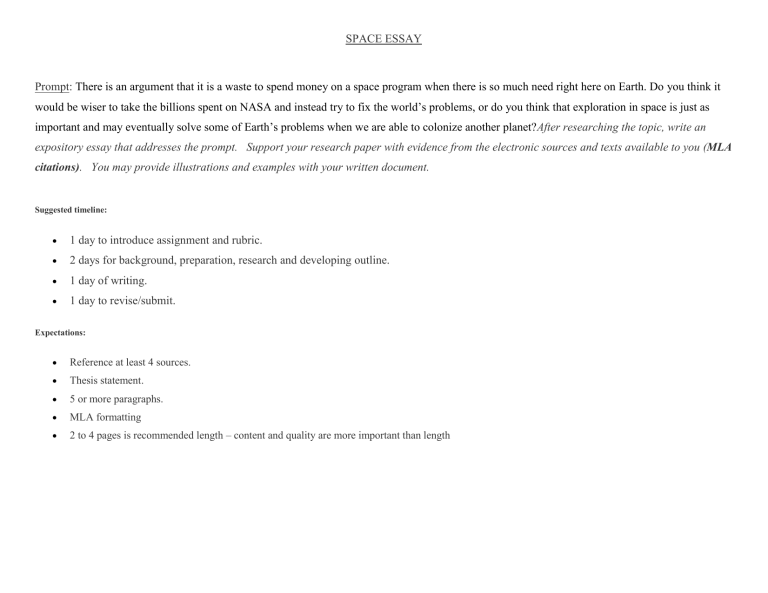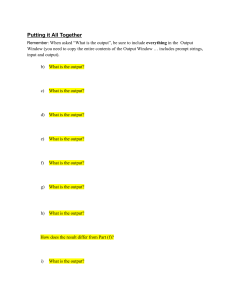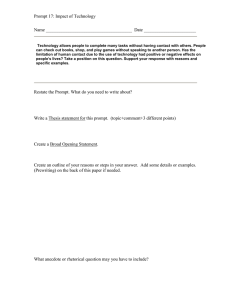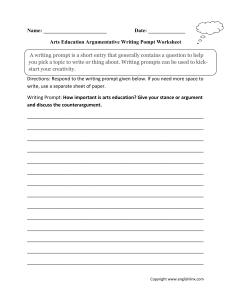
SPACE ESSAY Prompt: There is an argument that it is a waste to spend money on a space program when there is so much need right here on Earth. Do you think it would be wiser to take the billions spent on NASA and instead try to fix the world’s problems, or do you think that exploration in space is just as important and may eventually solve some of Earth’s problems when we are able to colonize another planet?After researching the topic, write an expository essay that addresses the prompt. Support your research paper with evidence from the electronic sources and texts available to you (MLA citations). You may provide illustrations and examples with your written document. Suggested timeline: 1 day to introduce assignment and rubric. 2 days for background, preparation, research and developing outline. 1 day of writing. 1 day to revise/submit. Expectations: Reference at least 4 sources. Thesis statement. 5 or more paragraphs. MLA formatting 2 to 4 pages is recommended length – content and quality are more important than length Resources – You may explore some/all of the following websites. Some of the sites have links to other pages or resources. When you are exploring the web for sources, it is important to make sure they are legitimate sites. 1. “NASA Budgets: US Spending on Space Travel since 1958”, The Guardian, February 1, 2010, https://www.theguardian.com/news/datablog/2010/feb/01/nasa-budgets-us-spending-space-travel 2. “The Expanding Universe”, Sloan Digital Sky Survey, accessed November 17, 2018 http://skyserver.sdss.org/dr1/en/astro/universe/universe.asp 3. David Salt. “Study Predicts Trillions of Planets”, ABC Science, September 24, 2003, http://www.abc.net.au/science/articles/2003/09/24/952646.htm 4. Mike Wall. “The Universe has Probably Hosted many Alien Civilizations: Study”, Space.com, May 5, 2016, https://www.space.com/32793-intelligent-alien-life-probability-high.html 5. Julia Driver. “The History of Utilitarianism”, last modified September 22, 2014, https://plato.stanford.edu/entries/utilitarianism-history/ 6. United Nations, Human Development Report 2014- Sustaining Human Progress:Reducing Vulnerabilities and Building Resilience (United Nations Development Programme, 2015), 19, http://hdr.undp.org/sites/default/files/hdr14-report-en-1.pdf 7. UNICEF, “Fact Sheet: Malaria, a Global Crisis”, last modified August 27, 2004 https://www.unicef.org/media/media_20475.html 8. Kathryn A. O’Connell et al., “Got ACTs? Availability, price, market share and provider knowledge of anti-malarial medicines in public and private sector outlets in six malaria-endemic countries”, Malaria Journal, October 31, 2011, https://doi.org/10.1186/1475-2875-10-326 9. Natalie Wolchover. “How many People can the Earth Support?”, Science Live, October 11, 2011, https://www.livescience.com/16493-people-planet-earth-support.html 10. Andrew Griffin. “Stephen Hawking: Space Travel will save Mankind and we Should Colonise other Planets”, Independent, February 20, 2015, https://www.independent.co.uk/news/science/stephen-hawking-space-travel-will-save-mankind-and-we-shou ld-colonise-other-planets-10058811.html 11. Sam Biddle. “How Many Nukes Would it Take to Blow up the Planet?”, Gizmodo, May 4, 2012, http://gizmodo.com/5899569/how-many-nukes-would-it-take-to-blow-up-the-entire-planet 12. Traci Watson. “86 Percent of Earth’s Species Still Unknown?”, National Geographic, August 25, 2011, http://news.nationalgeographic.com/news/2011/08/110824-earths-species-8-7-million-biology-planet-ani mals-science/ 13. Oishimaya Sen Nag. “How Much of the Ocean is Still Unexplored?”, World Atlas, last modified August 27, 2018, http://www.worldatlas.com/articles/how-much-of-the-ocean-is-still-unexplored.html 14. Charles Q. Choi. “Asteroids: Fun Facts and Information about Asteroids”, Space.com, September 20, 2017, https://www.space.com/51-asteroids-formation-discovery-and-exploration.html Not Yet Scoring Elements 1 Approaches Expectations 1.5 2 Meets Expectations 2.5 3 Attempts to address prompt, but lacks focus or is off-task. Addresses prompt appropriately, but with a weak or uneven focus. Addresses prompt appropriately and maintains a clear, steady focus. Reading/ Research Attempts to present information in response to the prompt, but lacks connections or relevance to the purpose of the prompt. (L2) Does not address the credibility of sources as prompted. Presents information from reading materials relevant to the purpose of the prompt with minor lapses in accuracy or completeness. (L2) Begins to address the credibility of sources when prompted. Presents information from reading materials relevant to the prompt with accuracy and sufficient detail. (L2) Addresses the credibility of sources when prompted. Controlling Idea Attempts to establish a controlling idea, but lacks a clear purpose. Establishes a controlling idea with a general purpose. Establishes a controlling idea with a clear purpose maintained throughout the response. Development Attempts to provide details in response to the prompt, including retelling, but lacks sufficient development or relevancy. (L2) Implication is missing, irrelevant, or illogical. (L3) Gap/unanswered question is missing or irrelevant. Presents appropriate details to support the focus and controlling idea. (L2) Briefly notes a relevant implication or (L3) a relevant gap/unanswered question. Presents appropriate and sufficient details to support the focus and controlling idea. (L2) Explains relevant and plausible implications, and (L3) a relevant gap/unanswered question. Attempts to organize ideas, but lacks control of structure. Uses an appropriate organizational structure to address the specific requirements of the prompt, with some lapses in coherence or awkward Maintains an appropriate organizational structure to address the specific requirements of the prompt. Focus Organization Advanced 3.5 4 Addresses all aspects of prompt appropriately and maintains a strongly developed focus. Accurately presents information relevant to all parts of the prompt with effective selection of sources and details from reading materials. (L2) Addresses the credibility of sources and identifies salient sources when prompted. Establishes a strong controlling idea with a clear purpose maintained throughout the response. Presents thorough and detailed information to strongly support the focus and controlling idea. (L2) Thoroughly discusses relevant and salient implications or consequences, and (L3) one or more significant gaps/unanswered questions. Maintains an organizational structure that intentionally and effectively enhances the presentation of information as required by the specific use of the organizational structure Conventions Content Understanding prompt. Attempts to demonstrate standard English conventions, but lacks cohesion and control of grammar, usage, and mechanics. Sources are used without citation. Demonstrates an uneven command of standard English conventions and cohesion. Accuracy and/or appropriateness of language and tone is uneven. Inconsistently cites sources. Demonstrates a command of standard English conventions and cohesion, with few errors. Response includes language and tone appropriate to the audience, purpose, and specific requirements of the prompt. Cites sources using an appropriate format with only minor errors. Attempts to include disciplinary content in explanations, but understanding of content is weak; content is irrelevant, inappropriate, or inaccurate. Briefly notes disciplinary content relevant to the prompt; shows basic or uneven understanding of content; minor errors in explanation. Accurately presents disciplinary content relevant to the prompt with sufficient explanations that demonstrate understanding. Demonstrates and maintains a well-developed command of standard English conventions and cohesion, with few errors. Response includes language and tone consistently appropriate to the audience, purpose, and specific requirements of the prompt. Consistently cites sources using an appropriate format. Integrates relevant and accurate disciplinary content with thorough explanations that demonstrate in-depth understanding.


